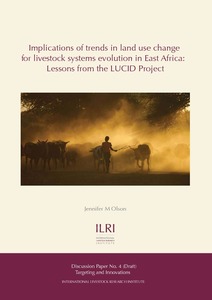Resource information
This report summarizes over 20 years of research on land use change patterns and processes in case study sites across Kenya, Tanzania and Uganda to provide information on the evolution of livestock in the systems. Many of the case study sites cross-ecological gradients, from the Highlands to the lowland savannas, and offer a glimpse of how the mixed crop–livestock, the agro-pastoral and the pastoral systems have evolved in relation to each other. The purpose of this report is to highlight major trends in relation to livestock; additional information on each of the case study sites, the research methodology employed and on particular components, such as the root causes of land use change, trends in changing biodiversity and land degradation,
as well as regional socioeconomic and environmental syntheses, can be found in the over 40 working papers of the Land Use Change, Impacts and Dynamics (LUCID) project.1 The LUCID working papers from which this report is drawn were authored by scientists and students in six institutions in East Africa, and by scientists and students in the US and France. Their
contribution to this report is gratefully acknowledged and, when directly used, cited. This report is drawn particularly from LUCID Working Paper 47, the East Africa regional syntheses of land use change (Olson et al. 2004b). We would also like to acknowledge the financial support to LUCID of the United Nations Environment Programme and the Global Environment Facility.



